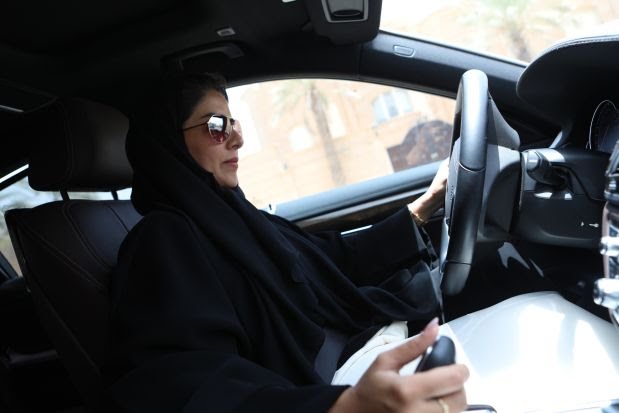Jailed Women’s Activists Tell Saudi Investigators of Torture (#GotBitcoin?)

Human-rights commission investigating alleged waterboarding, electrocution of activists who led campaign to end driving ban on women. Jailed Women’s Rights Activists Tell Saudi Investigators of Torture.
A human-rights commission reporting to Saudi King Salman is investigating the alleged torture of detained women’s rights activists, including accusations of waterboarding and electrocution, according to government officials and other people familiar with the activists’ situation.
A top aide to Crown Prince Mohammed bin Salman, Saud al-Qahtani, allegedly oversaw some aspects of the torture and threatened at least one jailed woman with rape and death, according to testimony before the commission, those officials and others said.
One activist told the commission that security officials electrocuted her hands. “My fingers resembled barbecued meat, swollen and blue,” the woman told Saudi investigators, according to a person familiar with her statement.
The alleged treatment of the activists, along with the killing of dissident Saudi journalist Jamal Khashoggi in the kingdom’s consulate in Istanbul, are part of what critics of the Saudi government say is a broad effort to quash dissent and limit freedom of speech.
The Saudi government has dismissed the allegations as “wild claims” and denied security officials tortured the detained activists, many of whom were men and women campaigning for women’s right to drive. Saudi government representatives didn’t respond to a request for comment for this article.
The Saudi Human Rights Commission was created by the country’s previous monarch, King Abdullah, in 2005 to primarily investigate allegations of government abuses and report them to the king. It has the power to refer cases to judicial authorities for criminal investigation, something it has done in the past. The commission began its investigation after The Wall Street Journal, rights groups and others in November reported on the alleged torture.
Saudi Arabia’s attorney general is currently conducting a separate investigation into the killing of Mr. Khashoggi. It has exonerated Prince Mohammad, saying he had no knowledge of the operation, although his top aide, Mr. Qahtani, was dismissed from his job and is implicated in the investigation.

The U.S. Senate last week unanimously passed a resolution with broad bipartisan support that condemned Mr. Khashoggi’s killing and said Prince Mohammed is responsible for his death.
Some of the imprisoned women’s rights activists were labeled as traitors in pro-government media and accused by the government of conspiring with unnamed foreign entities and of spreading discord in society. None of them have been formally charged.
Critics say the government targeted activists to send the message that change can only come from Saudi Arabia’s top leadership. Prince Mohammed has cracked down on internal opposition while he pushes through his agenda to liberalize Saudi Arabia’s conservative society and open up its oil-dependent economy to foreign investors.
The commission’s investigators began interviewing some of the kingdom’s most prominent women’s rights activists over the past month at Jeddah’s Dabhan prison, including Loujain al-Hathloul, a 29-year-old who was a leading figure in a grass-roots campaign to have the driving ban lifted.
Saudi security officers physically abused them, including by electrocution, lashing and sexually harassment. Some of the most severe treatment was meted out to Ms. Hathloul, according to the Saudi officials and other people familiar with the women’s situation.
Mr. Qahtani personally oversaw her interrogation, which included waterboarding, people familiar with her situation said. “Saud al-Qahtani threatened to rape her, kill her and to throw her into the sewage,” one of those people said.
Mr. Qahtani, Prince Mohammed’s former media adviser and a top lieutenant, has been sanctioned by the U.S. Treasury over Mr. Khashoggi’s murder. The report, citing people familiar with the matter, saying he played a central role in the operation that led to the journalist’s death. Before he was fired, Mr. Qahtani was in charge of the monarchy’s crackdown on those it viewed as dissidents.
Of the 18 detained activists, at least eight have been physically abused in custody, according to Saudi advisers, activists and others with knowledge of the prisoners’ treatment. Much of the abuse occurred in a government-run guesthouse in Jeddah in the summer months, before they were transferred to a regular prison, they said.
According to people familiar with their situation, the victims also include driving activists Aziza al-Yousef, a 60-year-old university professor; Eman al-Nafjan, a mother of three; and Samar Badawi, who is known for having opposed Saudi Arabia’s male guardianship rules and whose brother, liberal blogger Raif Badawi, is one of Saudi Arabia’s most prominent detainees.
Last week, Ms. al-Yousef, Ms. al-Nafjan and Ms. al-Hathloul were transferred from Jeddah to Riyadh’s al-Hayer political prison, according to two people familiar with the matter. The transfer could be an indication the activists will soon go to trial, as national security cases are often heard in Riyadh’s Specialized Criminal Court.
The Human Rights Commission has typically avoided highlighting politically sensitive issues in public, such as cases involving activists.
Some Saudi officials monitoring the situation said they are doubtful the investigation would lead to criminal charges.
“I don’t see how they will hold anyone accountable if they already publicly denied that the torture ever happened,” said a Saudi official who is aware of the torture allegations and of the commission’s investigation.
Disclosure of the probe could add to already intense pressure on the Saudi government over human rights.
“The detainment and torture of women’s rights activists demanding equal rights in Saudi Arabia is another example of how the current Saudi leadership does not share our values,” Sen. Chris Coons, Democrat of Delaware. “This pattern of human-rights violations is unacceptable, and it very well may have consequences for the bilateral relationship.”
Related Article:
CIA Concludes Saudi Journalist Was Killed on Crown Prince’s Order (#GotBitcoin?)
Go back
Leave a Reply
You must be logged in to post a comment.